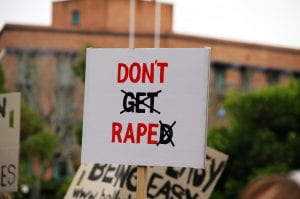by Yvette Russell*, The Law School, University of Bristol
In this seminar I argue for the need to think resistance to rape as part of a much broader feminist decolonial revolutionary praxis. I approach feminist anti-rape praxis in view of the consistent failure of criminal justice but also with an eye on the political present, which is characterised by profound inequality, state violence and repression, and the outright breakdown of many aspects of the social contract. To fully comprehend what the harm of sexual violence means and why it happens, we need to insist on a critical continuity between the diagnostic aspect of feminist philosophical scholarship on rape and a theoretically robust strategy for resistance.
To this end, I contend that prevention of and resistance to rape is not just about prohibitive laws that fix the iteration of the sex act and of sexed bodies, nor is it about the reconstitution of women’s bodies as ready to fight off rape through strategies like self-defence training. Drawing on the work of Māori feminist scholars I argue that feminist anti-rape scholarship must look beyond the act of rape as its point of departure for resistant praxis and instead orientate itself around radical ontologies of sexuate being that offer an alternative to those through which rape culture currently proliferates.
*This seminar was recorded as part of the International Critical Legal Seminars Series hosted by Critical Legal Thinking in association with the Warwick Centre for Critical Legal Studies. You can read Dr Russell’s article on which the seminar is based here (contact Dr Russell for access if you do not have a subscription.)

